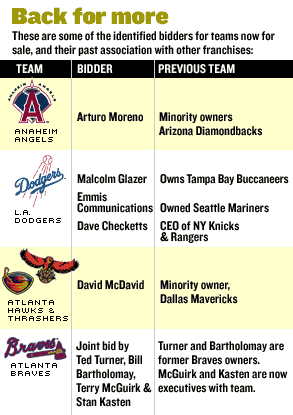
NEW YORK (CNN/Money) -
Owning a sports team is supposed to guarantee only one thing as an investment: turning a large fortune into a much smaller one.
Supposedly, the only way to make money on a team is to sell it for a profit to an even bigger fool. But with the bursting of the stock market bubble, even that way of making money is at risk, with too many sellers chasing too few fools, driving down prices for teams.
But a look at the list of those who are buying or discussing buying teams in this market suggests that maybe the economics of ownership aren't as hopeless as suggested by all the talk.

Those interested in buying are more often than not former owners -- either minority or majority holders --or team executives. These are men who have seen the books, know the true economics of the sport, and are still coming back for more.
So when Walt Disney Co. (DIS: Research, Estimates) went to sell the World Champion Anaheim Angels baseball team, they found a buyer in Arturo Moreno, a former minority owner of the Arizona Diamondbacks, which Major League Baseball statistics say lost $55 million winning the previous World Series.
David McDavid is identified as the leading bidder to buy the Atlanta Hawks basketball team and Atlanta Thrashers hockey team from AOL Time Warner, the parent company of CNN/Money. The Dallas auto dealer was a minority owner of the Dallas Mavericks, back before the NBA team had its current on-court success or taxpayer-supported palace to play in.
And AOL Time Warner (AOL: Research, Estimates) Chief Financial Officer Wayne Pace has said that a group bidding for the company's Atlanta Braves baseball team includes company Vice Chairman Ted Turner, former Braves owner Bill Bartholomay, and the company's top sports executives.
Fox Entertainment Group's (FOX: Research, Estimates) bidders for its Los Angeles Dodgers baseball team include the current owner of the National Football League's Tampa Bay Buccaneers, the former owner of baseball's Seattle Mariners, and the former CEO of both the National Basketball Association New York Knicks and National Hockey League New York Rangers.
Now given the number of people out there who marry and then divorce an ex-spouse, there is proof that some people just don't learn from their mistakes. But it's tough to believe all these people are rushing to re-enter a business they know to be a sure money loser.
"Some of them believe, because they are successful in other businesses, they can do a better job than the current owners," one leading sports investment banker told me this week.
The investment banker and others in the business insist that the losses some of the teams for sale are posting are real. But they admit that potential buyers also know that the losses aren't the whole picture in many, if not most, of these cases.
"A lot of time teams lose money, but there's money to be made on the building side," said one adviser to a current bidder for some of the teams for sale. "The Thrashers and Hawks both lose a lot of money, but the building (Philips Arena in Atlanta) makes money."
And the folks who buy the teams, often for top dollar, always insist that the way their sports business is structured makes financial sense.
| Related stories
|

|
|
|
|
That's the belief of John Henry, who sold the Florida Marlins and paid a record $700 million to buy the Boston Red Sox in 2002. He believes the other businesses that went with the sale, including the NESN regional sports network and venerable Fenway Park, made his deal make sense, and he believes he can rely on data skills that made him a fortune as a commodities trader to make better player personnel decisions. He told me earlier this year that even if he had a chance, he wouldn't undo his deal, and he doubts many buyers would either.
"Something is worth whatever a buyer and seller agrees it's worth," he said. "There hasn't been any fire sale in any sport."
And even the sports investment banker who insists that the current losses are outstripping any appreciation in the value of the team says potential buyers are right for seeing the possibility for profits in the future.
"If you buy it right, run it right, you can make money," he said. "You just have to look at upside as a long-term upside."

|

